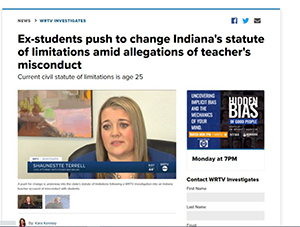Sexual Assault Statutes of Limitations: Archaic, Arbitrary, Absurd Deadlines
Anyone who’s ever taken in an episode of Law & Order (or even Night Court back in the day) has heard that strange term: Statute of Limitations, or SOL as we attorneys frequently refer to it. It seems like its meaning should be self-explanatory, but is it? In some ways, yes, but it is also extremely complex and convoluted. And, unfortunately, that matters.
 Recently, WRTV reporter, Kara Kenney, conducted an in-depth, exceptional investigation into the absurdity of Indiana’s statutes of limitations (SOLs) as they relate to sexual abuse and assault. What she uncovered is the single biggest impediment to helping sexual abuse survivors. In Kara’s report, the absurdity of Indiana’s SOLs has finally taken center stage. At CohenMalad, LLP we face this challenge with survivors every day.
Recently, WRTV reporter, Kara Kenney, conducted an in-depth, exceptional investigation into the absurdity of Indiana’s statutes of limitations (SOLs) as they relate to sexual abuse and assault. What she uncovered is the single biggest impediment to helping sexual abuse survivors. In Kara’s report, the absurdity of Indiana’s SOLs has finally taken center stage. At CohenMalad, LLP we face this challenge with survivors every day.
Childhood sexual abuse is pervasive throughout our society and affects a large percentage of both boys and girls. If a survivor of childhood sexual abuse decides at some point that they want to pursue civil litigation, they only have until seven years after reaching adulthood to file suit. Loosely, that will typically mean until the individual’s twenty-fifth birthday. If the lawsuit has not been filed by that date, the survivor is forever barred from filing suit. On its face, that may not seem like such a huge deal. However, the average age of disclosure for a person who was sexually abused as a child is 52 years old. That is more than double the years of life that person has lived when their statute expires. This is extremely alarming. Usually, at the time of a survivor’s twenty-fifth birthday, they have not yet fully realized the effect of the abuse on his/her life. Sexual abuse is not like a car accident. The survivor may not be fully aware of the misdeed, let alone the severe impact upon them for decades.
Real-life impact for sexual abuse survivors
It gets worse. If this is a person who was abused by someone at school (e.g., teacher, coach, etc.), there is an additional legal requirement. The survivor must file a technical, Tort Claim Notice within 180 days after their eighteenth birthday to give notice to the school that civil litigation against them may be pursued at some point. If that notice is not sent to the school within that time, the survivor is forever barred from holding accountable any school entity that was negligent in their hiring or retention practices. It is difficult to understand the rationale behind this deadline since it imposes a heavy burden on survivors while allowing perpetrators and their enablers to avoid responsibility and walk away scot-free.
Let’s look at this in a real-life, ongoing scenario. A local high school teacher was recently arrested for Child Seduction and Sexual Battery after assaulting a seventeen-year-old student. As is common, dozens of others have come forward since the perpetrator’s arrest to disclose repeated instances of sexual misconduct and assault at the hands of this teacher. Sadly, most of these cases are long past the expiration of the SOL.
One of these young women is now twenty-one years old. She was assaulted by this teacher when she was fourteen. At first, we were extremely optimistic that our CohenMalad, LLP team might be able to help this girl. But, sadly, we cannot. Why? Like almost all Hoosiers. she and her parents had never heard of the requirement to send a Tort Claim Notice so they didn’t do it. And why would they know of this obscure, arbitrary rule? Most attorneys aren’t even aware of this requirement, let alone a non-lawyer eighteen-year-old girl.
Survivors of sexual abuse deserve access to justice
Because this situation occurs so frequently among the survivors we meet with, we have joined with survivor groups, like Legislative Reform for Indiana’s Survivors (LRIS), to support efforts in the legislature to reform these archaic deadlines for the last several years. Unfortunately, our Indiana legislature has killed the bill, never even allowing it to have a hearing, despite the fact that such a bill has passed overwhelmingly in almost every other state where their legislature has voted on it. It seems nonsensical that Indiana legislators wouldn’t want to help protect children from sexual abuse and to help hold accountable perpetrators and enablers of days past. But that is the sad reality we face. The bill has already been killed for the 2021 legislative session as the Chairwoman of the Judiciary Committee refused to even grant it a hearing. Maybe next year, Senator Brown???




